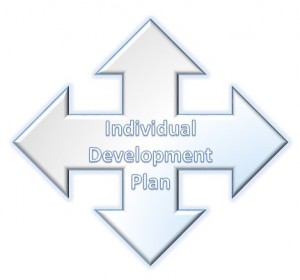By: Maria Qadri
“This feels like a high school career placement survey.” I heard a peer mutter this indignantly after finishing part one of their Individual Development Plan (IDP).
[caption id="attachment_522" align="alignright" width="308"] There are many directions for the future. An IDP can help you figure out which direction is best.[/caption]
There are many directions for the future. An IDP can help you figure out which direction is best.[/caption]
The idea of an IDP for the future comes from a common government and industry tool that has existed since as early as the 1970s. Large structured organizations have figured out how to streamline the process of defining an individual’s expectations, incorporating feedback from key players, and identifying resources to help achieve them.
I will openly admit that when I was asked to fill out my IDP as a 4th year PhD student, I groaned along with the other members of my cohort. How many mandatory forms and exercises do graduate students in the sciences have to complete in a year? Beyond our annual verification meetings with our dissertation committees and check-ins with our graduate program directors or fellowship committees, the purpose of all of these meetings gets lost in the shuffle akin to the way we go through the motions of experiments, write ups, and homework without pausing to think, “Why are we doing this?”
As I coerced myself through the entire process with a caffeine laden treat after each section, I slowly realized that this was a powerful tool that when utilized with the right attitude would help make me clarify the goals I had fuzzily suspected. The more effort you dedicate to answering the questions honestly, thoughtfully, and realistically, the better the result will be.
The benefits of completing an IDP include:
- Improved Motivation
When you complete the self-assessment, you realize how much you have accomplished even though you may go through your day to day feeling unaccomplished. Also, by reviewing this with your mentor, one of two things happens: they add to your list of accomplishments or they realize that you’ve accomplished more than they have realized. If neither of these happens, the appropriate course of action is to figure out what to do to fix that issue (see benefit 4).
- Exposure to other opportunities
The career exploration phase echoes the feeling of a career placement exam. However! The matching of your skills, interests, and values to possible future careers helps to realize the plethora of jobs available to people with PhDs. While I had been exposed to some of the other jobs in our career panels, matching my skills and interests with potential opportunities enticed me to explore them more deeply.
- Clarified Expectations
Uncommunicated expectations may be why so many students struggle through their graduate experiences and in extreme situation switch mentors at some point during their graduate experience. By writing down your goals and discussing them with your mentor, you can achieve a mutual understanding and agreement on your immediate and long-term direction.
- Establish a plan
The key to setting a goal is a specific, measurable, achievable, results-focused, and time-bound (SMART) plan, and the IDP process teaches you about how to design a series of SMART goals. Reviewing these goals with your mentor not only brings the idea to the forefront of their minds, it also affords them the opportunity to identify tools and resources to aid your success. After reviewing my plan with my advisor, we defined ways to help me improve my deficiencies and focus on gaining experience in the areas that match my future career aspirations.
The only substantial drawback is the time investment. I do guarantee that the results will help you realize your potential and sculpt the future that you want IF you are open minded. If this isn’t required for your research program, I highly recommend you try the entirely free MyIDP process. If this is mandated for your graduate degree program, how would you improve the process?
Useful links
Career Advice: “You need a game plan” http://sciencecareers.sciencemag.org/career_magazine/previous_issues/articles/2012_09_07/caredit.a1200100
MyIDP by AAAS: http://myidp.sciencecareers.org/